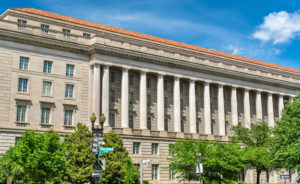
EPA Administrator Scott Pruitt resigns, Trump Administration rescinds guidance documents, and more…
IN THE NEWS
- U.S. Environmental Protection Agency (EPA) Administrator Scott Pruitt resigned from his post amid numerous ethics probes. On Twitter, President Donald Trump praised Pruitt for doing an “outstanding job” and announced that Deputy Administrator Andrew Wheeler will lead the EPA in the interim. Erich Pica, president of the environmental advocacy group Friends of the Earth, said that “Pruitt can no longer deceive Americans or destroy our environment” and hailed the work of “hundreds of thousands of activists who fought to protect the EPA.”
- The Trump Administration rescinded 24 guidance documents, including seven that promoted affirmative action in academic institutions. The U.S. Department of Justice stated that the rescinded guidance documents were “unnecessary, outdated, inconsistent with existing law, or otherwise improper.” Emily Martin, General Counsel at the National Women’s Law Center, criticized the move, stating that “rescinding this guidance does not change the law or established precedents” and urging all schools to “recommit to increasing diversity to promote equity for all students.”
- The rescinded guidance also included a 2011 document stating that refugees have the right to work in the United States, and a 2009 document that encouraged employers to avoid “citizen-only” hiring policies. U.S. Attorney General Jeff Sessions stated that he was targeting rules that agencies had imposed “without proper notice and comment period.” Richard Cohen, President of the Southern Poverty Law Center, called this a “patently false rationale” and stated that “the guidance documents were issued pursuant to legal authority exercised by both Republican and Democratic administrations alike.”
- District Judge Jesse Furman of the U.S. District Court for the Southern District of New York ordered the Trump Administration to provide information concerning the addition of a citizenship question onto the 2020 census. U.S. Secretary of Commerce Wilbur Ross announced the reinstatement of the question in March, claiming that such a question had historical precedents and that it was necessary to make the census more accurate. New York Attorney General Barbara Underwood praised Judge Furman’s order, saying that “by demanding the citizenship status of each resident, the Trump Administration is breaking with decades of policy and potentially causing a major undercount that would threaten billions in federal funds.”
- The U.S. District Court for the District of Columbia blocked the Trump Administration from detaining asylum-seekers without individualized determinations of whether they have a “credible fear” of persecution in their home countries. Judge James E. Boasberg ruled that the Immigration and Customs Enforcement (ICE) had not been following its 2009 directive, which requires ICE to make individualized parole determinations for asylum-seekers. “Having extended the safeguards of the Parole Directive to asylum-seekers,” Judge Boasberg wrote, “ICE must now ensure that such protections are realized.”
- The Supreme Court of California ruled 4-3 that Yelp cannot be ordered to remove user reviews found to be defamatory from the Internet. Writing for the majority, Chief Justice Tani Cantil-Sakauye held that Yelp is not a publisher of user reviews under the Communications Decency Act of 1996 and thus may not be sued over content posted by a user. Chief Justice Cantil-Sakauye, noting that the Communications Decency Act was enacted to allow the Internet to exist “unfettered by Federal or State regulation,” wrote that Congress intended to immunize Internet platforms from lawsuits that would be “stifling” or “skewing” to online discourse.
- Global Affairs Canada announced $13 billion in retaliatory tariffs on U.S. products, following President Trump’s imposition of tariffs on Canadian aluminum and steel. President Trump had originally excluded Canada from the tariffs but later decided that national security interests were sufficient to modify the policy. “The U.S. tariffs leave Canada no choice but to defend our industries, our workers and our communities,” stated Canadian Minister of Foreign Affairs Chrystia Freeland.
- The Animal and Plant Health Inspection Service (APHIS) within the U.S. Department of Agriculture issued a request for comment on the expansion of an experimental oral rabies vaccination trial. The vaccination program, currently in place in 16 states, distributes bait containing rabies vaccine, specifically targeting raccoon rabies, so that wildlife ingest the vaccine and develop immunity to rabies. APHIS published a supplemental environmental assessment analyzing the expansion of the field trial zone and its potential impact on wildlife, humans, pets, and livestock.
- On behalf of a disabled resident, the U.S. Department of Housing and Urban Development (HUD) charged the developers and architect of a 118-unit condominium complex (5SL) in Queens, New York with discrimination. HUD alleged that “the developers and architect had designed and constructed the building with numerous inaccessible features, a violation of the Fair Housing Act” and HUD requested damages, a civil penalty, and an order requiring the developer to “retrofit the public and common use areas and individual dwelling units at 5SL to comply with the design and construction requirements of the Fair Housing Act.”
WHAT WE’RE READING THIS WEEK
- In an issue brief, Jesús Fernández-Villaverde, a professor at the University of Pennsylvania, explored the potential effects of cryptocurrency competition on the U.S. monetary system. Fernández-Villaverde explained that “currency competition may have a large upside for human welfare” because the threat of private competition encourages central banks and governments to provide better administration of traditional currency.
- In a working paper, James Broughel of the Mercatus Center at George Mason University and W. Kip Viscusi of Vanderbilt Law School discussed the cost-per-life cutoff for regulations—the point where lifesaving regulations induce more fatalities than they prevent, thus increasing mortality. Broughel and Viscusi concluded that “any regulation costing more per life saved than $123.2 million will have counterproductive mortality effects” and noted the cutoff’s usefulness in identifying inefficient regulations.
- In a recent study, Anita Anand of University of Toronto Faculty of Law, Stephen Choi of New York University School of Law, A.C. Pritchard of University of Michigan Law School, and Poonam Puri of Osgoode Hall Law School found that the United States and Canada approach securities enforcement in insider trading cases differently in several significant respects. Canada’s enforcement intensity is higher than that of the United States, the authors found, but Canadian securities regulators focus on Canadian companies, whereas the U.S. Securities and Exchange Commission (SEC) brings more enforcement actions against non-U.S. companies. The authors also found that SEC is more than twice as likely as its Canadian counterparts to pursue the individuals who disseminate or use insider information.



